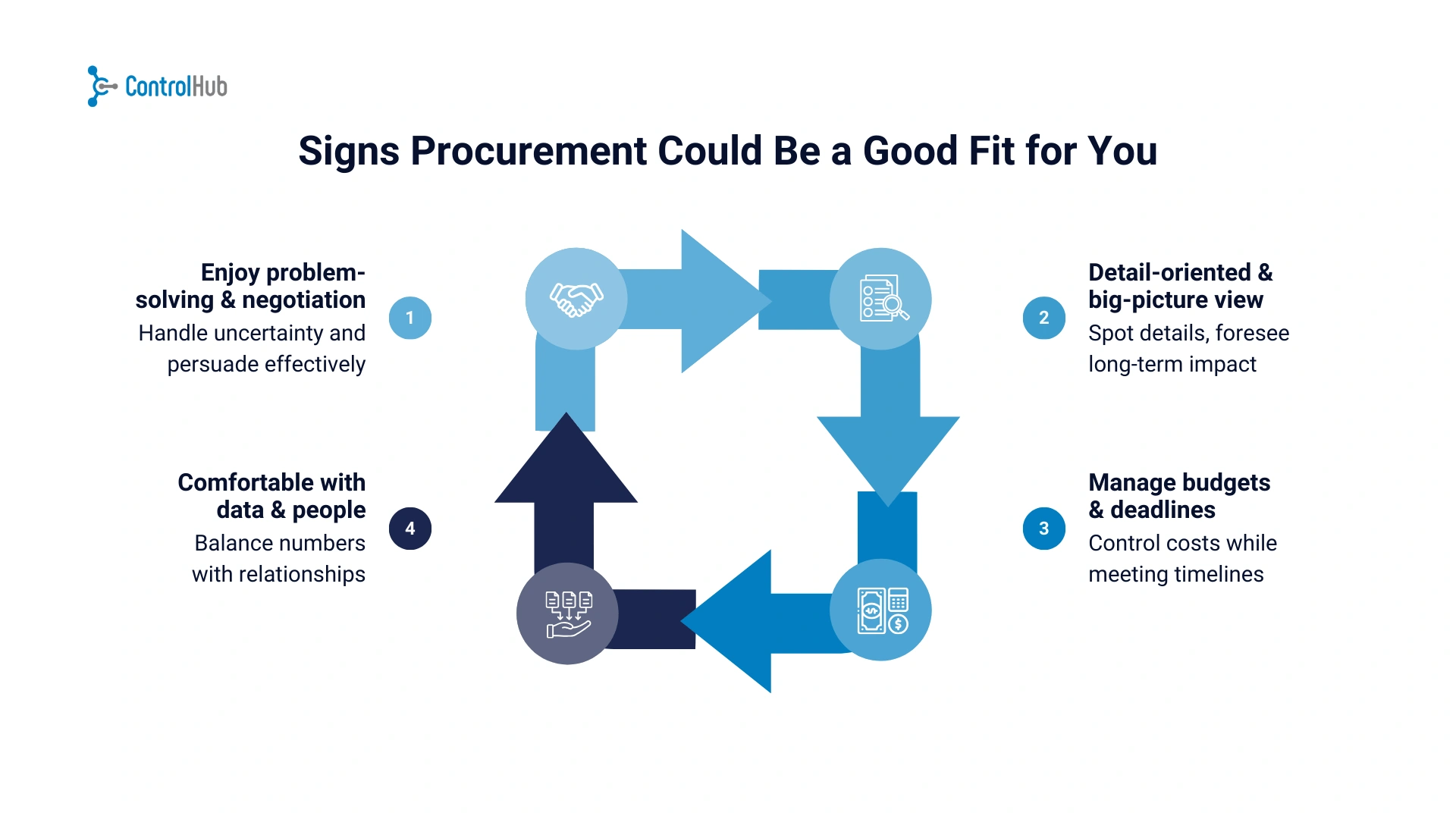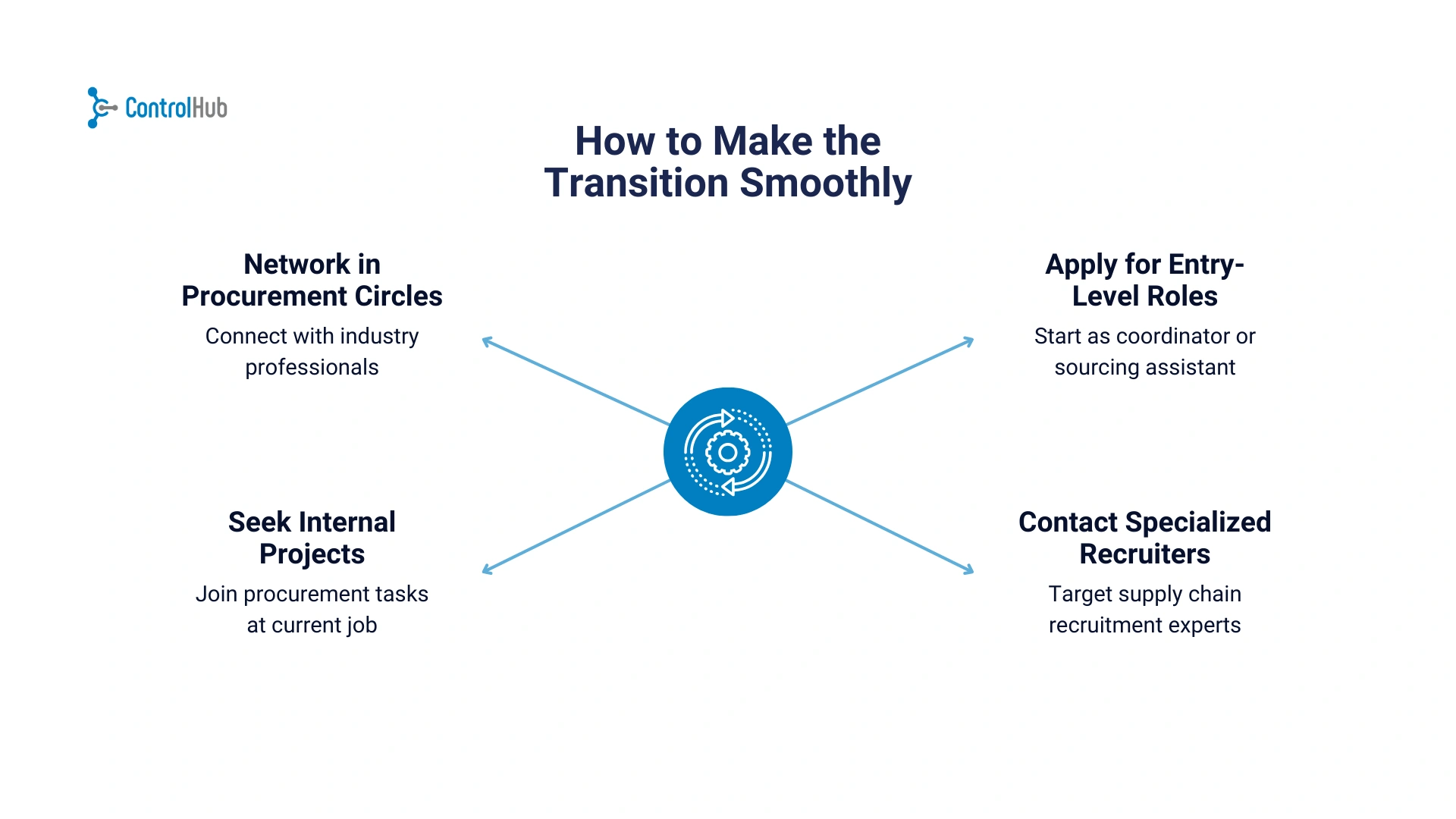Free Supplier Risk Scorecard Download
Download our free supplier risk scorecard here!
Download the free tool!AI Summarize:
Want to hear a bit of personal growth news?
Growing is far from being linear. You can jump around, walk in circles and zigzag if that's what you feel like.
Careers aren't meant to be static, you build knowledge, gather precious experiences and move onto trying new things.
So if you are feeling rather done with your current role and industry, why not consider procurement as the next move?
Signs Procurement Could Be a Good Fit for You
You enjoy problem-solving and negotiation
Forget about all the certificates and courses for a moment. If you want to start working in procurement, you need to be able to figure out the best way to solve problems on the go. Procurement is erratic on the good days. Bad days?
It can be the perfect material for nightmares.
Picture yourself in a lot of what-if scenarios. How would you deal with the uncertainty and the pressure?
Can you be sufficiently persuasive to win over a negotiation?
Those are the questions that matter.
You’re detail-oriented but also see the big picture
Yes, yes keeping a close eye on the fine print at the end of a contract or quote is critical for short-term success.
But that's not all. You also need to picture how each decision is going to affect timelines, budgets, and the overall company's goals.
You like working with both data and people.
Data is fundamental, good data, that's it, but it's relying on loyal people.
If you come from an analyst role, it'd be smart to take a breath and really see if you'd be comfortable participating actively in meetings, calls, and negotiations.
Procurement is all about finding the right balance between numbers and relationships.
You’re comfortable managing budgets and deadlines.
Procurement is a dynamic industry, and so it involves dealing with multiple priorities.
You’ll need to keep things moving without letting costs spiral out of control.
Free Supplier Risk Scorecard Download
Download our free supplier risk scorecard here!
Download the free tool!Transferable Skills You Already Have
We get it
Making a career change sometimes might feel scary. Especially if you feel like you are leaving a good part of your life behind
Well, here is some good news:
Your past experience, no matter the industry, has been quietly training you for this move.
You’re not starting at zero; you’re just rebranding your skills for a new audience.
If you’re coming from sales:
You’ve been living and breathing negotiation, even if it wasn’t called that in your job description.
In sales, you know how to find common ground, listen to others, and do your best to obtain all the benefits your company was expecting.
For procurement?
Those experiences and achievements mean a lot.
The same instincts you relied on to make a deal can now help you secure better terms from suppliers while keeping relationships strong for the long haul.
If you’re from operations or project management:
You’ve been the one making sure moving parts actually move.
You understand the domino effect of a delay, and you’re great at keeping multiple threads organized under tight deadlines.
So why not use that mindset to select reliable vendors, anticipate roadblocks, and keep supply lines running no matter what?
All those things can pretty much predict the success of any procurement strategy
If you have a finance or accounting background:
Fluent in the language of budgets, forecasts, and cost control?
Congratulations
You have half of the work already done.
Those who have worked with financial services before can spot when numbers are drifting off course and can translate spreadsheets into decisions. Little skills that can make a big difference in procurement
If you’ve worked in customer service or hospitality:
You’ve mastered the art of staying calm when things go sideways, managing expectations, and solving problems in real time.
Those skills translate perfectly into supplier relationship management, where diplomacy can be just as important as the contract itself.
Soft skills
Communication above all
Whether it’s explaining a decision to a stakeholder or pushing back on a supplier, clarity matters.
Regardless of your previous role, there's a high chance you've dealt with difficult situations with colleagues or customers.
If you know how to listen and give people the space to share their pain points, you are more than ready to deal with a negotiation like a procurement professional.
Stakeholder management: Fancy term, that in some way or another focuses on keeping multiple people with different priorities happy while still delivering the results the business needs.
For all those salespeople out there, you certainly got this part covered.
Adaptability
Here's the thing about procurement.
Things can go crazy overnight. Your ability to pivot without losing momentum is huge here. Don't let the excitement deceive you; procurement is a tough industry, and you must be mentally prepared for all sorts of unexpected problems.
Hard skills
Data comfort: Whether it’s Excel, Google Sheets, or ERP reports, if you feel like there's no data set you cannot handle, you will be fine with a lot of procurement daily responsibilities.
Contract basics: Even a little experience reviewing agreements can be helpful to detect risks before they become problems.
Tech familiarity: If you’ve worked with inventory systems, procurement platforms, or CRM tools, you’re on the right track.
Free Supplier Risk Scorecard Download
Download our free supplier risk scorecard here!
Download the free tool!Filling the Gaps: Skills and Qualifications to Develop
Learn the basics
It doesn't matter how much experience and soft skills you are bringing from your previous career.
You still need to get fully familiar with all the core concepts surrounding procurement. A little time with industry articles, webinars, or online courses can get you there faster than you think.
Consider a certification
Not mandatory per se, but might be quite useful if you are serious about showing your commitment to the industry.
- CIPS (Chartered Institute of Procurement & Supply): Widely recognized internationally.
- CPSM (Certified Professional in Supply Management): Common in the U.S.
- PMP (Project Management Professional): Helpful if your role leans into project-based procurement
Get acquainted with procurement software.
You don’t need to master every platform, but understanding how an e-procurement system works will help you in interviews and on the job.
Low-cost ways to learn:
- LinkedIn Learning and Coursera for structured courses
- YouTube for quick “how-to” refreshers
- Industry blogs and LinkedIn groups for real-world insights
How to Make the Transition Smoothly
- Start by networking within procurement circles
- Seek procurement-related projects in your current role, all companies are involved with procurement somehow.
- Consider applying for entry-level or transitional roles (procurement coordinator, sourcing assistant)
- Get in touch with recruiters who specialize in supply chain roles
Free Supplier Risk Scorecard Download
Download our free supplier risk scorecard here!
Download the free tool!Free Supplier Risk Scorecard Download
Download our free supplier risk scorecard here!
Download the free tool!%20(1).avif)




.webp)













.png)


